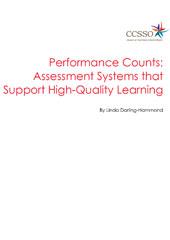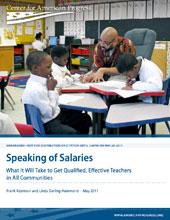Performance Counts: Assessment Systems that Support High-Quality Learning

Darling-Hammond describes what a student assessment system could look like if built from current research principles and best practices found around the world.

Darling-Hammond describes what a student assessment system could look like if built from current research principles and best practices found around the world.

This study looks at the staggering numbers of suspensions and expulsions between 7th and 12th grade in Texas and examines the impact of those removals on students' lives.

Frank Adamson and Linda Darling-Hammond examine how and why well-qualified teachers are inequitably distributed to students in the United States.

Vanessa Siddle Walker invokes the voices of black educators who challenged the diluted and failed vision for an integrated South after 1954's Brown v. Board of Education.

In this article, Sean Reardon et al. challenge the assumption that income integration guarantees racial desegregation in U.S. schools.

George Lipsitz explores the legal reasoning behind and consequences of the 2007 Supreme Court case Parents Involved in Community Schools v. Seattle School District No. 1 et. al.

Paul A. Jargowsky and Mohamed El Komi examine the relative impact of school and neighborhood contexts on 5th through 8th grade math and reading scores.

Lani Guinier argues that to address the full range of racialized inequities, racial justice advocates need to move beyond the early tenets of racial liberalism to racial literacy.

In this speech, Parent, President of the Centrale des syndicats du Québec, looks at historic and modern trends in Canadian education policy, and their impact on equity in Canadian schools.

In this paper, Ben Levin argues that policy approaches to educational improvement are necessarily different in Canada and the United States, and that greater equity in education can be achieved using practices we already know to be effective.